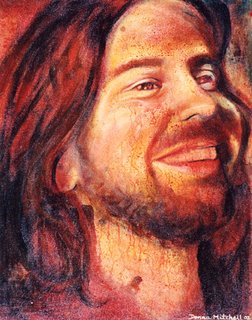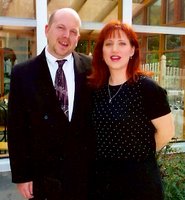The article listed below is really long and violates all of the "blogging rules" too long. But it will cause you to contemplate. I am not making a judgment or running out to heat my house with wood...but I am thinking, contemplating on what all of this means. So I say to the brave read it, and shoot us some of your comments. This is definitely a READ, THINK, PRAY, LIVE kind of thing. We will post something a bit funnier tomorrow.
Consumed by the CultureProtestantism helped create our materialistic society. Can this same faith now save us from ourselves?by Rob Moll, highlighting articles from Christianity Today Library
In another month, post offices around the country will be open till midnight as last-minute tax filers rush to send their returns to the IRS prior to the April 15 deadline. But many others will have already received and spent their refund through accounting offices that will prepare your filing and advance your refund. Of course, they take a hefty chunk out of that refund, but for many it's a great way to get a hold of some extra money. They're willing to spend money for quicker access to their own money. It's a symptom of our overly consumeristic culture: We need more, we need it cooler, faster, bigger, louder, and we need it now.
Pastor Mark Buchanan calls it the "Cult of the Next Thing." Its gospel is, "Crave and spend, for the Kingdom of Stuff is here." He says, "If ever there was a cult that gave us stones when we asked for bread, this is it."
The average American views 3,500 advertisements per day. No wonder this cult is so enticing, so attractive. Imagine how attractive God would be if we read 3,500 verses per day. Bombarded not only by the blatant methods of advertising, we're also coerced by the pressures of our friends, coworkers, and neighbors to remain on the lookout for the next satisfaction. "For Christians, this is a problem," Buchanan says.
The problem is ethical, spiritual, theological. And, of course, practical. The one time Jesus got violent was when the temple had been made into a marketplace. Jesus brooked a lot of things with uncanny calmness—demoniacs yelling at him, religious leaders plotting against him, thick-headed, slow-hearted disciples bossing him. But moneychangers and holy-trinket sellers put a wildness in him. And lest we miss the object lesson, Jesus puts his opposition to the Cult of the Next Thing in plain speech: 'No one can serve two masters. … Don't worry about having enough food or drink or clothing.'We've Created a Monster.
In "Why the Devil Takes VISA," Rodney Clapp shows how Protestant culture unwittingly helped to create our consumer culture. Capitalism is not natural to human nature, he says. Most people simply want to maintain the style of life they're accustomed to. It took a lot of work to reshape our ethic of maintaining into one of gaining.
First, Clapp says, Protestants introducing the idea of a "calling"—the idea that one's livelihood is not just an income generator, but also a means to glorify God. "And evidence or assurance of their salvation flowed from the success of their calling." But it is a theology of work, not of gain, and it encourages a strict, sober lifestyle. "But there were ironic consequences. As John Wesley famously worried, the Protestant Ethic must 'necessarily produce both industry and frugality, and these cannot but produce riches. But as riches increase, so will pride, anger, and love of the world in all of its branches.'"
As the line between production and consumption blurred, consumption required a theological justification. Revivalism led to an individualistic and subjective brand of Christianity. Such revivals were the perfect place for those hawking medicines. Advertising grew out of the patent medicine trade, and medicine ads grew out of the testimonials of revival meetings. Christians, knowledgeable in attracting hearers to gospel meetings, used their promoting skills for Coca-Cola, department stores, and other 19th-century inventions.
Revivalism, according to Clapp, "brought Christianity lock, stock, barrel, and Bible into the marketplace and redefined faith in terms of the marketplace. It refined close observation and exquisite stimulation of feelings." As the Industrial Revolution produced more goods than could be consumed, advertising was used to stimulate excessive consumption. Soon, products, seen in advertisements, sought to fulfill consumers' every desire. Advertising material products sought to satisfy the eternal needs of the soul.What to Do?
"Since consumer capitalism … so effectively promotes its version of the good life, and since consumers are made rather than born, a Christian response demands a consideration of character," Clapp says.
One response, not limited to modern America, is simple living, and one of its promoters is Arthur Simon, founder of Bread for the World. Simon's book How Much Is Enough? exposes our self-defeating desire for more. In his review of the book, John Schneider writes, "How pathetic and sad it is to think that we could be so very affluent and still not be content." Simon says that the amount Americans spend to feed their pets is enough to feed the hungry in the rest of the world. It is a shame that Americans still pursue more things, while so many go hungry. (It is an argument also made more than 20 years ago by Ron Sider.)
On a personal level, Simon says we must practice simple living. Live on less; stop the pursuit for things that rust and moths and thieves destroy. But Schneider says Simon's—and other's—call for simple living as normative for Christians is wrong. "If the consumption of luxuries is morally evil, what is the consequence for our Christian teaching on vocation in business and the professions? Nearly all occupations in modern capitalism are immersed in the business of creating markets for, manufacturing, wholesaling, advertising, competing, retailing, and/or investing in the habitual consumption of non-necessities."
If consuming too much is wrong, is it also wrong to work in an advertising department that encourages others to consume? Is it wrong to manage a factory of luxury cars for others to spend outrageous amounts of money on, while others starve? This critique shows us that Protestant theology is indeed tied to consumerism, for if it is wrong to consume certain things or too much of necessities, it is wrong to encourage others to do so. And that would mean not all occupations can be a calling in the Reformation sense. It also shows that by questioning one aspect of consumer society, we must reassess our relationship to the rest of it.
Still, many have found ways to live mainstream lives while resisting the pressures of consumerism. Sider, whose Rich Christians in an Age of Hunger has sold more than a quarter million copies and whose latest, The Scandal of the Evangelical Conscience (excerpted here), is unsettling readers today, has no problem teaching, writing, working for social justice, and living in a middle-class area of Philadelphia. In a 1992 profile of Sider, Tim Stafford writes, "The Siders' décor falls somewhere between graduate student and junior faculty, comfortably worn. They buy most of their clothes in thrift shops, but they have cordless phones and answering machines and a nice TV. … The Siders heat with a wood stove, and the stovepipe snaking through the kitchen and woodpiles in back of the house—Sider scavenges the wood from neighborhood trees and chops it himself, for exercise."
Clapp tracks three other approaches: that of a wealthy banker, a middle-class couple, and the Bruderhofs. Malcolm Street takes time away from his job at a bank to put himself in the position of the vulnerable. Mission trips to Haiti and Liberia, volunteering 30 percent of his time, generous giving, and building assisted-living apartments for the elderly help Street combat the normal effects of his social station. "A kind of vulnerability can help revive sensibilities and empathies dulled by satiating overconsumption. A degree of affluence not only insulates us from a keen awareness of our limits and mortality, but, through indulgence, it can coarsen the senses of sight, sound, taste, smell, and touch so that we require increasingly gross stimuli to experience pleasure."
Lendol and Kathy Knight Calder live in a middle-class suburb. They have a house, a church, and nature. They stay away from television, take frequent walks through the park, and have taught their children to listen to God speaking through the wind, the leaves, and the lap of the lake. They celebrate the church year through fellowship and worship. Another option for people like the Calders is to practice ethical investing, where their stocks and mutual funds do not profit from immoral enterprises. The Bruderhof Communities have more radically abandoned consumer culture and the culture at large. They have several communities of 300 to 400 people. They hold all things in common, submit to the rules of the community, yet run businesses to provide income for the group. "The Bruderhof exemplifies the importance of a culture that encourages and supports alternative practices to a pervasive and powerful consumerism."
As Arthur Simon says in How Much Is Enough?, it is impossible to say exactly what or how a Christians or families should change their economic habits as opposed to the average consumer's habits. Yet the values inherent in today's consumer culture are not consistent with Christianity. As Clapp says, "People of faith living amid overweening consumerism have a responsibility to resist where they can to cultivate the good life as it is understood in the Christian tradition. So we are impelled both theologically and strategically to devote attention to the peculiarly and explicitly Christian formation of character, to build a Christian way of life or culture."


















